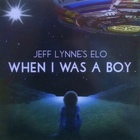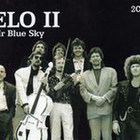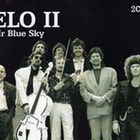Elo

- Genre:
- Rap
Electric Light Orchestra (ELO) was a very successful rock music group of the 1970s and 1980s, formed in Birmingham, England. They incorporated the sounds of string ensembles, vocoders and dub echos into rock songs, thereby creating a very sophisticated studio version of rock. The musical content of ELO songs often went far beyond usual chord structures, mixing pop songwriting with classical romanticism and synthesized sounds. The band claim that their music ?picks up where The Beatles left off.'
Formed in 1970 by Roy Wood, Jeff Lynne and Bev Bevan (the remaining members of the 1960s rock group The Move). The band used cellos, violin, horns and woodwinds to give their music a classical sound. This was an idea Roy Wood initially had while with The Move, to take rock music in a new direction. In 1970 when Carl Wayne left the The Move, Jeff Lynne, front man with fellow Brum band Idle Race, responded to Wood's second invitation to join the line-up, with the lure of starting the new band. To help finance the fledgling project, two more Move albums were released during the recording of their eponymous first album in 1971 which produced the UK hit 10538 Overture. In the US this album was released with the mistaken title of No Answer, due to a mix-up with an uncompleted telephone call to the American label and subsequent secretarial message.
However, tensions soon surfaced between Roy Wood and Jeff Lynne. With most of the media attention focused on Roy Wood, differences in musical direction, and a disastrous first live outing, it was no surprise when the band went through the first of its many line-up changes as Wood took Hugh McDowell and Bill Hunt with him to form Wizzard. Despite the music press's predictions that the band would fold without Wood, Jeff Lynne stepped up to lead the band, with Bevan remaining on drums, bassist Richard Tandy switching to moog synthesizer, Michael d'Albuquerque on bass, Mike Edwards, Colin Walker (cello) and Wilfred Gibson replacing Steve Woolam on violin. They released ELO 2 in 1973, from which came their first U.S. chart hit, a hugely elaborate version of the Chuck Berry classic Roll Over Beethoven. After their second album, violinist Gibson was dismissed and replaced by Mik Kaminski. They also released On the Third Day in 1973, with Mike Edwards playing all the cello parts due to Colin Walker leaving the band. Later that same year saw the return of Hugh McDowell, who had jumped ship the year previous, to replace cellist Colin Walker.
In 1974 Lynne hired a thirty-piece orchestra, choir and Louis Clark, then began work on the next LP Eldorado, A Symphony, a concept album about dreams, scoring their first U.S. Top Ten hit with Can't Get It Out Of My Head in 1975. Eldorado would become ELO's first gold album.
After the release of Eldorado, bassist and vocalist Kelly Groucutt and cellist Melvyn Gale joined, replacing de Albuquerque and Edwards respectively.
- Sort by

When I Was A Boy (CDS)
- Year:
- 2015
- Tracks:
- 1
- Bitrate:
- 320 kbps

Mr Blue Sky CD2
- Year:
- 2004
- Tracks:
- 14
- Bitrate:
- 320 kbps

Mr Blue Sky CD1
- Year:
- 2004
- Tracks:
- 12
- Bitrate:
- 320 kbps